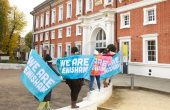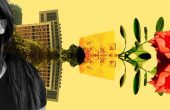Writing about the legacy of the Queen Elizabeth Olympic Park (QEOP) and the development of a cultural and education quarter, the Guardian’s Oliver Wainwright states that UAL’s London College of Fashion will mean “ready-made beautiful people to drape themselves stylishly across the terraces.”
When is this myopic view of an industry that is worth a direct contribution of 26billion to the UK economy going to stop?
This new district is one of the most significant regeneration developments that London has seen in years and by bringing such world-leading institutions together we will have real impact on a local community that is thriving already with creativity and diverse innovation.
Fashion is not a frivolous subject and fashion colleges are not full of people focused on draping themselves about. We have far too much to be getting on with.
Just like our partners – V&A, Sadlers Wells and UCL East – we are already working on a number of projects in the local area and within local communities, as well as looking at the longer term infrastructure around incubation and the development of an East London Fashion Cluster. By creating a Cluster we have an unparalleled opportunity to fully integrate the fashion industry in East London focusing on hi-tech and the digital interface. Such a Cluster can help create jobs and facilitate convergence between traditional skills based in fashion design and making and the very latest technological inventions.
A good example of this is the creation of a Global Disability Innovation Hub. The aim of this permanent GDHub is to explore innovation through the dual lenses of design for disability and disability inspired design. Pulling together expertise from leading academics across the QEOP partners, including UCL, Loughborough London, V&A, Saddler’s Wells, LCF and also the Helen Hamlyn Centre (RCA).
Last year LCF also successfully won a £3.9 million bid to build on and support fashion’s heritage in East London. The Fashioning Poplar project is a partnership between LCF and housing association Poplar HARCA to deliver a new East End based fashion hub including commercial studios, a fashion business space, a manufacturing unit, a fashion technology accelerator, a public café, events space, and a community focused outdoor area. Fashioning Poplar will support existing East London fashion enterprises, create further economic growth and social engagement initiatives for the area and is a significant step along the road to an East London Fashion Cluster.
Furthermore, the manufacturing unit will provide employment and training to a local workforce within Poplar and to ex-offenders graduating from the unit’s sister project, where LCF has been running manufacturing and skills training in HMP Downview.
One of our University Research Centres, The Centre for Fashion Curation, along with our Social Responsibility team at LCF, has worked together on a new travelling exhibition project called Cabinet Stories, which is visiting communities across east London delivering workshops from curators and fashion practitioners and taking the ideas of exhibition and curation into places that would not normally engage with this form of showcase.
The Cabinet Stories exhibitions explore topics such as Fashion and Sport in 1910, Fashion and Fiction looking at how designers have used comic strip icons in their collections, Spinning Yarns exploring forgotten crafts, Unfolding Fashion: Fans and the Art of Advertising by Jacob Moss, curator at The Fan Museum, and Little Ghosts by Oriole Cullen, senior curator at the V&A. The cabinet has travelled to the East London NHS Foundation Trust – a facility providing mental healthcare, and a residential care home for the elderly. It opens to the public in September 2016 at Chrisp Street Market in Poplar.
Last month students from our Sportswear and International Fashion Production courses came together in Dalston, to celebrate the relaunch of the Circle Collective store. The evening featured an in-store catwalk show and work of our students set alongside that of the collaborators within this brilliant social enterprise. Circle Collective was created to help unemployed young people acquire and develop the workplace skills, confidence, positive mindset and self-discipline needed to secure life-changing permanent employment. We are look forward to continuing our work with Circle Collective in the future.
And last week we had excellent reviews over our recent collaboration with Studio Wayne McGregor and Studio PSK to bring Polyphonic Playground into Here East on the Olympic Park, marking the start of a fusion between dance, fashion, technological creativity and social interaction. The installation, based on the joy of children’s playgrounds, saw visitors interacting with the large timber framework and using various triggers to play sounds whilst a brand new performance — Thigmo (the Greek word for touch) — by choreographer Eleesha Drennan, explored the visceral bonds between touch, dance, sound, and technology.
So, these latest projects are many and varied and we are proud of them but they aren’t just the start. As a College we have been based in the East End of London and have been nurturing creative talent for over a century, we have been working with young people and community groups in this area for as long as I can remember.
London College of Fashion is shaping lives through fashion. We believe in the contribution that fashion has to our economy (93% of our undergraduates are in work or further study 6 months after graduating according to the DHLE), our identity and our society.
We regularly use it as a way to reach people who have been marginalized and people who are looking for their own individual ways to make a contribution.
At a time in the UK when collaborative unity across communities is vital, we will continue to take this commitment with us along the journey to our new home at the Olympic Park.
There are definitely some beautiful people at LCF, but that’s not all we have here.
Professor Frances Corner, OBE
Pro Vice-Chancellor, UAL and Head of London College of Fashion




